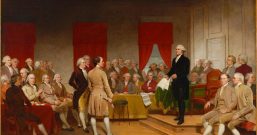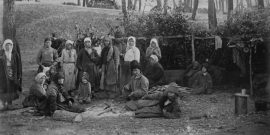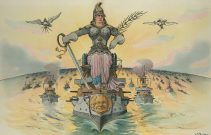Anne Murphy deftly pieces together a picture of the Bank of England’s London infrastructure in the mid-1700s.
William Anthony Hay
The change and disruption over recent decades may suggest the rise of a new political order. But not everything is as new as it seems.
The institutional development, planning, and professional ethos behind naval operations provide the context that made famous victories possible.
We need elites who operate with an eye to the public welfare, not progressive ideology.
Fukuyama’s thesis may not have proven true, but it certainly proved useful for framing a post-Cold War order for public consumption.
Putin gambled that Ukraine would fall quickly, bolstering his legacy and political standing. That gamble has failed.
What made unified, Imperial Germany both lasting and fragile at the same time?
Like the novel, written constitutions tell the story of a place and people.
Attention is a limited resource in government and public culture, and making one thing a priority leaves less time for others.
It is hard to see how 9/11 could not have dominated American life at least for a time, but the long-term shifts were dire.
An Account of Denmark shows how subverting constitutional liberties made a free government despotic.
Why we should remember Russell Kirk's John Randolph of Roanoke.
Recognizing the inevitability of differences, 18th-century theorists of party sought to manage tensions rather than promote a misleading consensus.
Was the study of history really a vehicle for the growth of the British Empire?
Anglo-American cooperation in World War II offered a foundation for "the American Century" by making US policy global rather than hemispheric.
A new compilation of an old British debate sheds light on what makes armies safe for liberty.
How the Old World Ended looks beyond how industrialization began to consider what made the way of life it displaced so vulnerable to disruption.
Rather than a threatening, extremist force, Dueck takes nationalism as an established phenomenon with roots in the Founding era.
Public relations seems to have been the Afghanistan War’s most successful operation.
Quigley’s concerns point to the unease, if not fear, that lay behind the optimism and talk of vigor that characterized America during the Kennedy era.
Then as now, where people stood on history and how they understood their place in the flow of time shaped their actions.
Had the costs of war and revolution been understood, Russia might have avoided much of what it suffered over the 20th century.
The centenary of the armistice should prompt some reflection on the dangers of rolling what Otto von Bismarck called the iron dice of war.
Hazony's The Virtue of Nationalism helps build a realist conception of political order that goes beyond theory to understand history.
David Armitage offers tremendous insight into civil wars and how to understand them, but not in the usual social scientific or historical key.
Eliot Cohen presents a world full of threats, but not all of them are best addressed with military power.
The Landsdowne Letter was a moderate and measured statement that called on the Allies to end World War I.
Helprin proposes a military buildup to facilitate a strategy of counter-pressure and deterrence.
William Anthony Hay is Associate Director for Public Programs and Professor with the School of Civic and Economic Thought and Leadership at Arizona State University. He is also the author of Lord Liverpool: A Political Life, and The Whig Revival, 1808-1830.








































